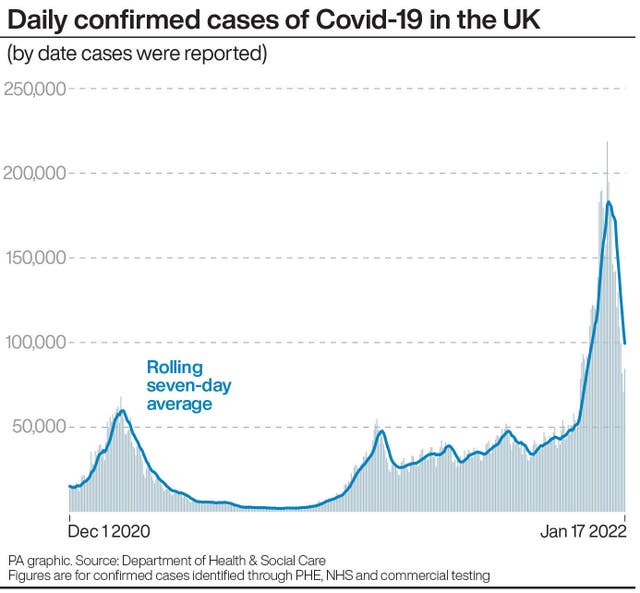
Booster jabs against Covid-19 may not be needed by everyone in the future if it mutates into a seasonal, less severe, virus.
Professor Andrew Hayward, a member of the Scientific Advisory Group for Emergencies (Sage), said that it “doesn’t do the virus any good” to increase in severity, though new variants may prove to be even more transmissible than Omicron.
He said that it is hoped that the “direction of travel” for Covid-19 variants is that they become less severe over time.
Prof Hayward said that any new variant would need to “out-compete Omicron” through increased transmissibility or escape from immunity, and not through changes in severity.
“It doesn’t do the virus any good to become increasingly severe,” he said.
“In fact, it looks like the Omicron variant, by becoming more transmissible, that it’s also become less severe, and we would hope that’s the general direction of travel.”

He said that in future not everyone would need booster vaccines, adding: “I think the people that we might want to think about boosting the most are the same as flu really – people with chronic illness and elderly people – and we’ll probably move into a sort of more regular annual vaccination programme, or it may not even need to be that frequent.
“We need to wait for the evidence on that.”
Prof Hayward said he agreed the “pandemic will end” and people will live with the virus continuing to transmit “but causing much less disruption”.
He added: “It will tend to, I think, settle into a seasonal pattern – we may still get quite big winters of infection but not the sort of level where we can justify wholesale societal closedown.
“So, I think it is genuinely an optimistic picture, but we’re still not quite there yet.”
READ MORE: Nicola Sturgeon set to ease restrictions today
The University College London (UCL) expert said there were “very encouraging signs” of cases plateauing or dropping in some places, but nobody was sure whether they will stabilise at a very high level or dip down.
The latest UK data shows 84,429 people were reported as positive for Covid on Monday, with the seven-day rolling average showing a 42% drop in cases in a week.
Meanwhile, hospital admissions remain fairly static, though they are falling in some parts of the country.
 (PA Graphics)
(PA Graphics)
New data from the Office for National Statistics (ONS) is due to be published on Wednesday afternoon which will show the level of infection across the community in people with and without symptoms.
Elsewhere, Dr David Nabarro said it is “important that there is no premature promising that restrictions will end at a particular time” after suggestions the Government will drop Plan B at the review stage on January 26.
READ MORE: No need for fourth jabs to protect elderly says JCVI
The World Health Organisation’s special envoy on Covid-19 told BBC Breakfast: “I’m a public health person … I would not be making promises some time in the future because, once you make a promise, it’s super hard then to change what you’re going to do – you feel you’re kind of doing a U-turn.
“This virus is constantly evolving and it’s super hard to predict where it will be – we can say where we hope we’re going to go, we can say where we’d like to go, we can say what we think we need to do to get there – but making promises that we’ll do something on a particular date, I think, is unwise.”
Dr Nabarro reiterated his view that the situation in the UK “gives us grounds for hope” but continued to urge caution.
“The goal that we’re all aiming for is a situation where this virus is present, but life is organised so that it is not disrupted,” he said.
“We also need to be humble, this virus is continuing to evolve and we’re never quite sure that we know exactly where it’s going to go next.”



Why are you making commenting on The Herald only available to subscribers?
It should have been a safe space for informed debate, somewhere for readers to discuss issues around the biggest stories of the day, but all too often the below the line comments on most websites have become bogged down by off-topic discussions and abuse.
heraldscotland.com is tackling this problem by allowing only subscribers to comment.
We are doing this to improve the experience for our loyal readers and we believe it will reduce the ability of trolls and troublemakers, who occasionally find their way onto our site, to abuse our journalists and readers. We also hope it will help the comments section fulfil its promise as a part of Scotland's conversation with itself.
We are lucky at The Herald. We are read by an informed, educated readership who can add their knowledge and insights to our stories.
That is invaluable.
We are making the subscriber-only change to support our valued readers, who tell us they don't want the site cluttered up with irrelevant comments, untruths and abuse.
In the past, the journalist’s job was to collect and distribute information to the audience. Technology means that readers can shape a discussion. We look forward to hearing from you on heraldscotland.com
Comments & Moderation
Readers’ comments: You are personally liable for the content of any comments you upload to this website, so please act responsibly. We do not pre-moderate or monitor readers’ comments appearing on our websites, but we do post-moderate in response to complaints we receive or otherwise when a potential problem comes to our attention. You can make a complaint by using the ‘report this post’ link . We may then apply our discretion under the user terms to amend or delete comments.
Post moderation is undertaken full-time 9am-6pm on weekdays, and on a part-time basis outwith those hours.
Read the rules hereLast Updated:
Report this comment Cancel